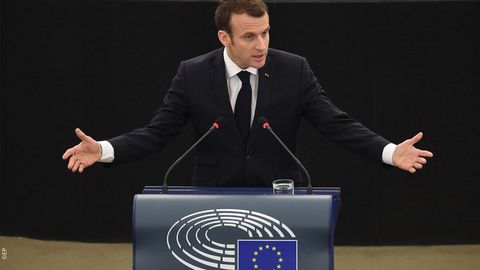Our vision on …
What might the French EU Presidency mean for EU-UK relations?

It’s been a week since President Macron addressed the European Parliament in Strasbourg to mark the beginning of France’s Presidency of the Council of the European Union. France’s strong emphasis on European sovereignty may see Britain having to deal with a more politically united EU
As well as giving it responsibility for chairing EU business, taking on the Presidency of the Council gives an EU member state the chance to set out its own agenda for the bloc over the next six-month period.
Ahead of the official start of the period, the French government announced three main ambitions for its Presidency. These are:
- A more sovereign Europe
- A new European model for growth
- A humane Europe
France seems to be pushing for a united, pan-European approach to the bloc’s international dealings – and with the UK now outside it, this may make it more complicated to resolve bilateral issues going forward.
Implications for Franco-British relations
Macron did not devote much time to discussing EU-UK relations in his speech last week, explicitly commenting that he did not want to “dwell on this subject”. He affirmed that despite Brexit, the UK and the EU had enough common ground on work “to defend liberal democracy, freedom and economic and social progress” for friendly relations to endure.
Nonetheless, he added the caveat that “continuing along this shared path after Brexit requires the British Government to comply in good faith with the agreements concluded with our Union, and requires us to clearly ensure the commitments are respected.”
To anyone who has followed Macron’s rhetoric on the UK in recent months, this kind of language will sound familiar: whilst the relationship between the UK and the EU is solid, strong concerns about trust remain.
The Northern Ireland protocol
The issue of the Northern Ireland border protocol, which keeps Northern Ireland within the EU single market, is perhaps the best example of this. Whilst the mechanism has helped to ensure frictionless trade, the British government’s insistence on renegotiating the deal has frustrated EU leaders.
Meetings between Foreign Secretary Liz Truss and her European counterpart, Maroš Šefčovič, continue – although their meetings have mostly ended in short joint declarations saying that talks will continue, and there is no sign of a breakthrough at any time soon. In light of France’s vision of “a more sovereign Europe”, the united front that the EU has been keen to show over the issue will probably deepen.
With UK companies already experiencing problems related to recruitment due to Brexit, further tensions over the protocol cannot be giving much comfort to businesses.
The migrant crisis
The deaths of 27 people trying to cross the Channel in December caused a major diplomatic rift between the UK and France – and with France now steering the EU’s policy programme, the issue of cross-Channel migration might become a more prominent theme of disputes with the bloc.
The French government has already signalled its intention to push for a new UK-EU treaty on migration. According to a French official, such a treaty would create “a legal means of immigration with Great Britain, so people can legally go to Great Britain to seek asylum.”
Other EU member states are understood to be less enthusiastic about this proposal, however. European Commissioner for Home Affairs Ylva Johansson said last month that there was “limited” Europe-wide appetite to strike a formal agreement – with the primary reason for this being dissatisfaction with the Brexit deal. For now, then, it seems more likely that the French government will have to address this issue on its own.
How much will change?
More cynical observers might wonder whether Macron’s speech served more as a genuine articulation of his vision or a simple publicity exercise ahead of this year’s presidential elections. Nonetheless, the French government’s ambitions for the EU between now and June seem clear. The UK government can expect the bloc to be just as dedicated to ensuring that, as Macron says, it respects its commitments.